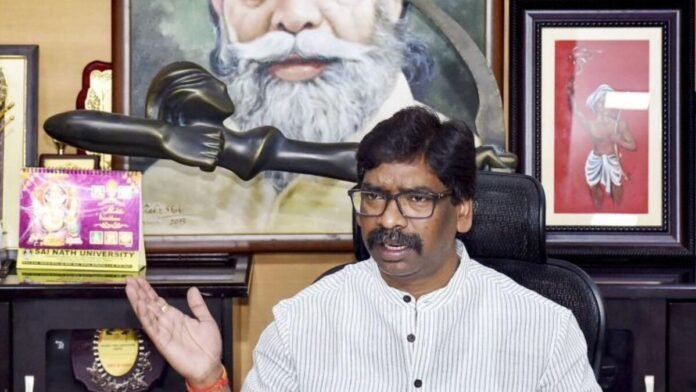In a significant event, Hemant Soren, the Chief Minister of Jharkhand, has filed a First Information Report (FIR) against officials of the Enforcement Directorate (ED) over searches conducted at his Delhi residence. The move comes amidst escalating tensions between state governments and central investigative agencies, sparking debates over the limits of federalism, political vendetta, and the rule of law.
The incident unfolded when the Enforcement Directorate carried out searches at Hemant Soren’s Delhi residence as part of a money laundering probe. The ED’s actions drew immediate criticism from Soren and his political allies, who denounced the searches as politically motivated and an attempt to intimidate opposition leaders. Soren’s decision to file an FIR against ED officials marks a bold escalation in the confrontation between the state government and central agencies, raising questions about the autonomy of state governments and the impartiality of investigative bodies.
At the heart of the controversy lies the broader issue of federalism and the balance of power between the central government and state administrations. Critics argue that the use of central agencies to target opposition leaders undermines the principles of federalism enshrined in India’s constitution, which envisages a cooperative and collaborative relationship between the center and states. By resorting to tactics perceived as coercive and overbearing, central agencies risk eroding the autonomy and integrity of state governments, thereby weakening the federal structure of the Indian polity.
Furthermore, the FIR lodged by Hemant Soren underscores the deep-seated suspicions surrounding the motives behind such investigations. Allegations of political vendetta and selective targeting of opposition leaders have been leveled against central agencies in the past, raising concerns about the impartiality and independence of investigative bodies. Soren’s decision to take legal action against ED officials reflects a growing sense of defiance among opposition leaders against what they perceive as arbitrary and politically motivated actions by central agencies.
Moreover, the incident reignites debates surrounding the rule of law and the accountability of law enforcement agencies. While investigative bodies like the Enforcement Directorate are tasked with upholding the law and combating financial crimes, their actions must be conducted within the bounds of legality and with due regard for civil liberties. Soren’s FIR highlights the need for greater transparency, oversight, and accountability in the functioning of investigative agencies to prevent their misuse for political ends and to safeguard the democratic principles enshrined in India’s constitution.
In response to the FIR filed by Hemant Soren, the Enforcement Directorate has defended its actions as part of routine investigations into financial irregularities. The agency has emphasized its commitment to upholding the rule of law and conducting its operations in a fair and impartial manner, irrespective of political considerations. However, skepticism persists among opposition leaders and civil society groups, who view such assurances with suspicion given past instances of alleged abuse of power by central agencies.
The standoff between the Jharkhand government and the Enforcement Directorate is emblematic of broader tensions between state administrations and central agencies in India’s political landscape. As state governments assert their autonomy and resist what they perceive as encroachments on their powers by central authorities, the stage is set for protracted legal battles and political wrangling. At stake is not only the fate of individual leaders like Hemant Soren but also the principles of federalism, the rule of law, and the democratic fabric of the nation.
In addition, Hemant Soren’s decision to lodge an FIR against ED officials over searches at his Delhi residence marks a significant development in the ongoing power struggle between state governments and central investigative agencies. The incident raises important questions about federalism, political vendetta, and the rule of law, underscoring the need for greater transparency, accountability, and respect for democratic norms in India’s governance. As the confrontation continues to unfold, the eyes of the nation remain fixed on the outcome, which has far-reaching implications for the future of Indian democracy.

